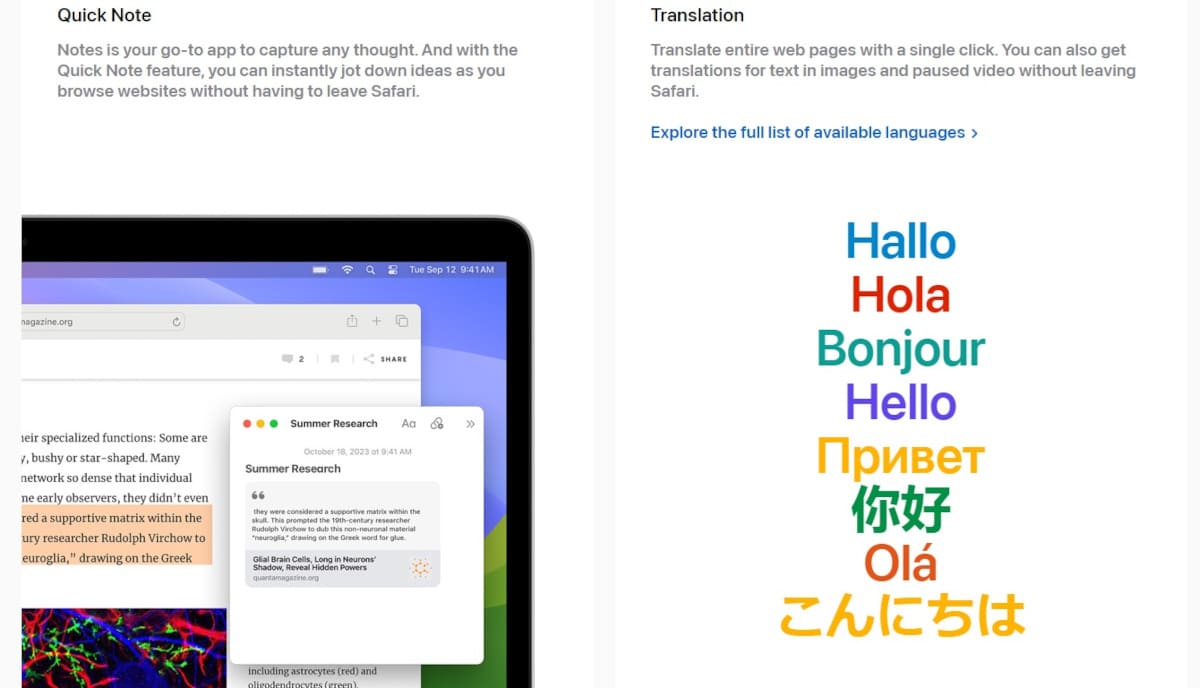Definitive guide
Real-time statistics about Safari
Safari Statistics 2026 – 28 Key Figures
Are you looking for Safari statistics?
Perhaps you want some actual numbers on Safari statistics to back up an article you’re writing. In any case, you found the right article.
Let’s dive into some actual key figures and facts about Safari statistics.
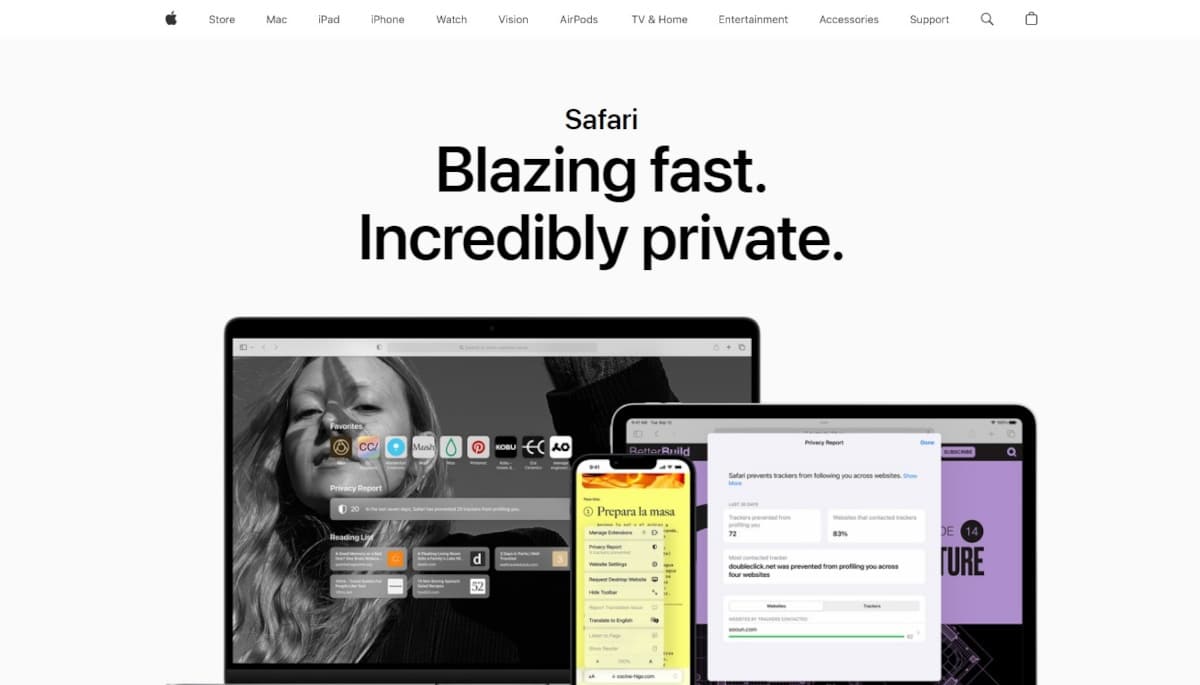
1. As of February 2025, Safari retains its position as the #2 browser in the world.
Safari encompasses 17.62% of the global internet browser market as of February 2025. It retained being second to Google whose market share was 66.16% for the period. Edge had a 5.17% market share and Firefox had half of it at 2.52%. The market share of Samsung Internet was 2.22% and Opera was 2.14%.
Last November 2024, Safari’s market share in the internet browser category is at 18.22%. It similarly ranked second in market share compared to Google’s 67.48% for the period. Third in line was Microsoft’s Edge, with a 4.84% market share. Firefox, Samsung Internet, and Opera followed suit with a market share of 2.60%, 2.18%, and 2.00%, respectively.
Safari is Apple’s default web browser for iOS and macOS. Its seamless compatibility with other Apple devices is a major selling point. Some users may not like Safari’s stripped-down UI, but others prefer it. In addition, it has a reputation for being secure and private.
Safari, like many of its rivals, has a private browsing mode. Sites are executed in a sandbox, making it impossible for malicious programs to infiltrate the user’s device.
2. Safari’s market share declined by 0.65% in three years.
Despite retaining its post as the 2nd most used internet browser in the world, Safari’s market share declined by 0.65% in 2024 compared to 2021 data. Safari had an 18.34% share of the market, with 844 million users in 2021. The record shows that Safari’s market share climbed by almost 5% in 2021 compared to the previous year.
The world’s fastest browser, Safari, is powered by a lightning-quick JavaScript engine and was designed to run exclusively on Apple devices. It is optimized to maximize battery life and provide sustained power. Additionally, it is speedier than ever, thanks to Apple’s silicon.
3. Safari’s market share has been declining at an average of 0.48% in a decade.
Records show that Safari’s share of the global browser market has been declining by an average of 0.48% from 2014 to 2024. Data from 2014 to 2015 show that Safari’s growth rate decreased by 0.71%. A decrease in growth rate of 0.08 % can be seen from 2017 to 2018. This is not to mention the 0.65% decrease in market share from 2021 to 2024.
4. 22.89% of the mobile browser market uses Safari as of November 2024.
Safari accounts for 22.89% of all mobile device browsers globally, which is a far cry from Google’s 68.69%. Safari has a massive rate of user adoption. As a result, it’s crucial to guarantee a consistent and secure web experience across all platforms.
For the period, Samsung Internet was seen regaining momentum at a 3.47% market share. Opera is way behind in mobile usage at 1.59% followed by UC Browser at 1.24%. Fireflox still made it to the top five with a market share of 0.51% as of November 2024.
5. Safari’s share of the mobile browser market declined by 3.74% in two years.
Safari accounted for almost a quarter of the mobile browser market globally in November 2024 at 22.89%. However, this market share is 3.74% lower than its previous scope in 2022 of 23.78%.

6. Safari ranks #3 in global desktop browser usage in November 2024.
Chrome and Edge outnumbered Safari in global desktop browser usage in November 2024 at 66.31% and 12.91%, respectively. Safari’s market share for desktop usage for the period was only at 9.13%, which is only 2.68% higher than Firefox’s.
7. The gap in the number of Safari users against Chrome is smaller for the tablet browser market by 16.45%.
Safari encompasses 33.24% of the global tablet browser market as of November 2024. Chrome, on the other hand, has a 49.69% share of the tablet browser market for the same period. This shows a growth opportunity for Safari to focus more on tablet users given the small gap in the market share versus its tough competitor by 16.45%. That and improving its platform’s friendliness for mobile users where it has fallen two slots behind Chrome.
8. Safari is the 2nd most-used browser in the United States in 2024.
As of November 2024, Safari ranks #2 in the United States for browser market share. Safari is used by 32.55% of Netizens in the country, lagging behind by only 21.87% behind Chrome and 26.33% ahead of Microsoft Edge. Safari also fares better than Firefox by 29.05% and Samsung Internet by 31.07%.
Data shows that Chrome is used by 54.42% of Netizens in the United States. While Edge, Firefox, and Samsung Internet only get a 6.22%, 3.50%, and 1.48% share of the market, respectively.
9. The gap in the number of Safari users against Chrome in the US mobile browser market was 2.05% in 2024.
Statista reported that Safari came in close to Chrome for US mobile browser usage in December 2024 at a mere 2.05% gap. Chrome’s market share for mobile usage in the United States for the period was at 48% and Safari’s was 45.98%.
Statista explained that Safari’s standing in the mobile browser market reflects the Apple iPhone’s high usage in the United States. Safari is a pre-installed internet browser in Apple iPhones.
10. Apple’s Safari was the #1 mobile and tablet browser in the United States in 2022.
With a 51.13% market share in August 2022, Apple’s Safari was the most widely used mobile internet browser in the United States. Google Chrome, which held a market share of only about 42%, landed in second place.
2022 records show that Safari was more popular than Chrome in 49 of the 50 US states. Safari is also widely used in countries besides the United States.
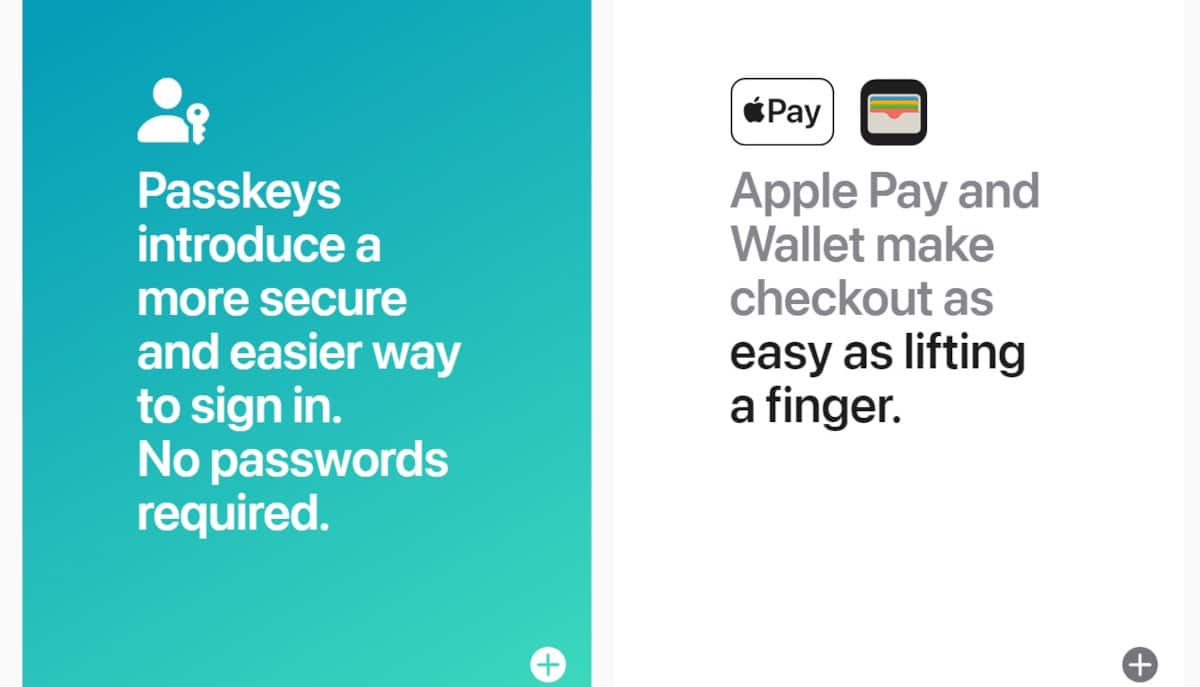
11. There are more Safari users in Japan than in China, showing a 10.61% gap.
November 2024 data show that Safari’s share in the internet browser market in Japan was 24.89%. This means there are 10.61% more users of Safari in Japan than there are in China where it only has a 14.28% market share.
Safari ranks 2nd in the internet browser market for both countries, which is dominated by Chrome. The number of users for Chrome in China is at 48.39% and in Japan is at 55.66%.
12. 4.23% is the average growth rate of Safari in the Vietnamese browser market in three years.
Records show that Safari held a 15.54% share of the Vietnamese browser market in 2021, which grew by 3.46% the year after at 19%. Safari’s market share for the browser market in Vietnam further grew by 5% in 2023 to 24%.
13. Safari’s share in the Taiwanese mobile browser market increased by 0.18% in two years.
Safari’s share in the Taiwanese mobile market slightly grew by 0.18 in 2024 compared to data two years earlier. In February 2022, Safari accounted for about 45% of the Taiwanese mobile browser market, while Apple was the dominant Taiwanese smartphone market leader. Safari then encompassed 45.18% of the said market in 2024.
14. An 18.02% drop was seen in the Hong Kong browser market share of Safari over four years.
The market share of Safari in Hong Kong saw a staggering decline of 18.02% from December 2021 to February 2025. In 2021, Safari almost had a 40% market share in Hong Kong. This became 21.98% in February 2025.
Chrome dominates the Hong Kong browser market with 59.79% in February 2025. The entry of new players such as Microsoft Edge (6.3%) and Samsung Internet (4.89%) are possible reasons in the decrease in Safari users in the country.
15. The average number of Safari users in the Indian browser market is 2.61% over four years.
February 2025 data from StatCounter show Safari as the third most-used browser in India with a market share of 2.72%. This slightly lower by 0.03% three years ago when Safari’s market share was at 2.75%.
Though it is relatively higher by 0.36% to the August 2021 data when Safari’s browser market share in India was approximately 2.36% in August 2021. Safari is outrun by Chrome and Opera whose market share is at 88.79% and 3.45% in February 2025, respectively.
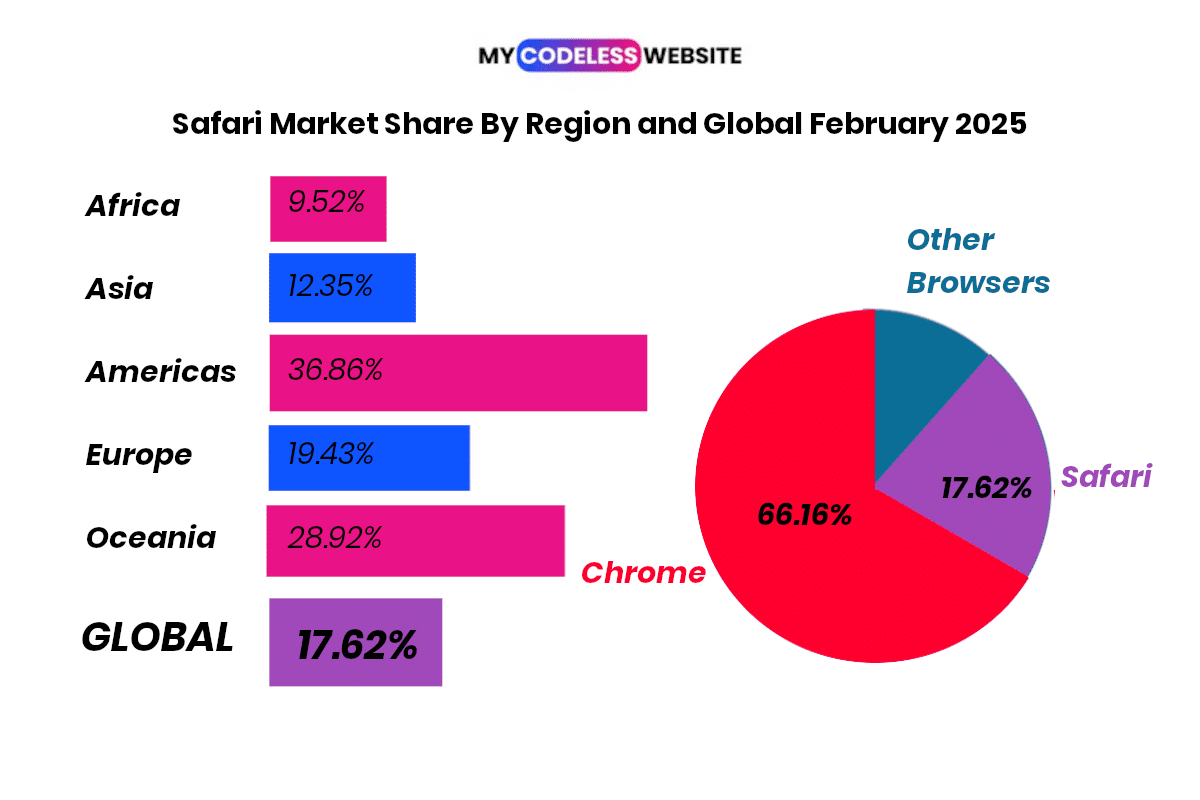
16. 12.35% of the browser market share in Asia belongs to Safari as of February 2025.
Safari accounts 12.35% of the Asian browser market as of February 2025, which is 59.52% behind Chrome. Safari, nevertheless, has a market share thrice than that of Microsoft’s Edge (4.21%) for the period. Samsung Internet, Android, and UC Browser respectively enjoys 2.1%, 1.92%, and 1.77% of the Asian browser Market as of February 2025.
Chrome remains to have the largest market share in Asia. In 2021, Chrome accounted for 71.22% of the browser market when Safari only had 14.45% of it. Safari had strong usage figures in North America, Europe, and Oceania, it remains far behind Chrome during that year.
17. Safari has a tight competition with Chrome in North America at almost 50-50 mobile browser market share in February 2025.
February 2025 data on the North American mobile market share show a neck on neck battle between Chrome and Safari. 48.23% of the mobile browser market in North America belongs to Chrome, leading Safari slightly behind by only 2.87%.
Safari accounts for 45.36% of the North American mobile market as of February 2025. It enjoys a big market share than that of Samsung Internet (3.15%), Mozilla Firefox (1.1%), Brave (0.66%), and Opera (0.5%) for the said period.
In 2021, Safari is used by roughly 1/3 of all internet users in North America when Chrome had a great market share advantage.
18. 19.43% of the European internet browser market is Safari’s.
Safari enjoys 19.43% of the internet browser market in Europe as of February 2025. Though it is only second to Chrome (61.49%), Safari’s share of the region is bigger than the combined market share of its other competitors. These competitors are Edge (6.28%), Firefox (4.28%), Samsung Internet (3.16%), and Opera (2.71%), whose combined market share is 16.43%. Safari still leads by 3%.
19. Safari’s market share in Oceania is almost 2x smaller than Chrome’s.
The number of Safari users in Oceania is 2x smaller than Chrome users as of February 2025. Data from StatCounter show that 28.92% of the region’s internet browser market belong to Safari. Chrome, on the other hand, is used by the majority of internet users in the region at 56.03%.
Edge ranks third since it accounts for 7.22% of the market. This is followed by Samsung Internet and Firefox with 2.8% and 2.67% share of internet browsers in the region. Opera is the least-used internet browser, having only a 1.12% market share.
20. Safari surpassed one billion users in April 2022.
TechCrunch reported that Atlas VPN surveyed the market distribution of major internet browsers in April 2022 based on GlobalStats data. The survey results showed that Safari reached its first one billion customers during that period though it still lagged behind Chrome.
According to the survey, Apple’s Safari was used by 1,006,232,879 internet users as of April 2022. This comprised 19.16% of all internet users. Google Chrome, on the other hand, has a staggering 3,378,967,819 users. With roughly 212,695,000 users, Microsoft Edge earned the third place for the period.
Firefox was used by almost half of Microsoft Edge users at 179,084,224. Samsung Internet and Opera were not far behind with 149,674,515 and 108,710,963 users, respectively, in April 2022.
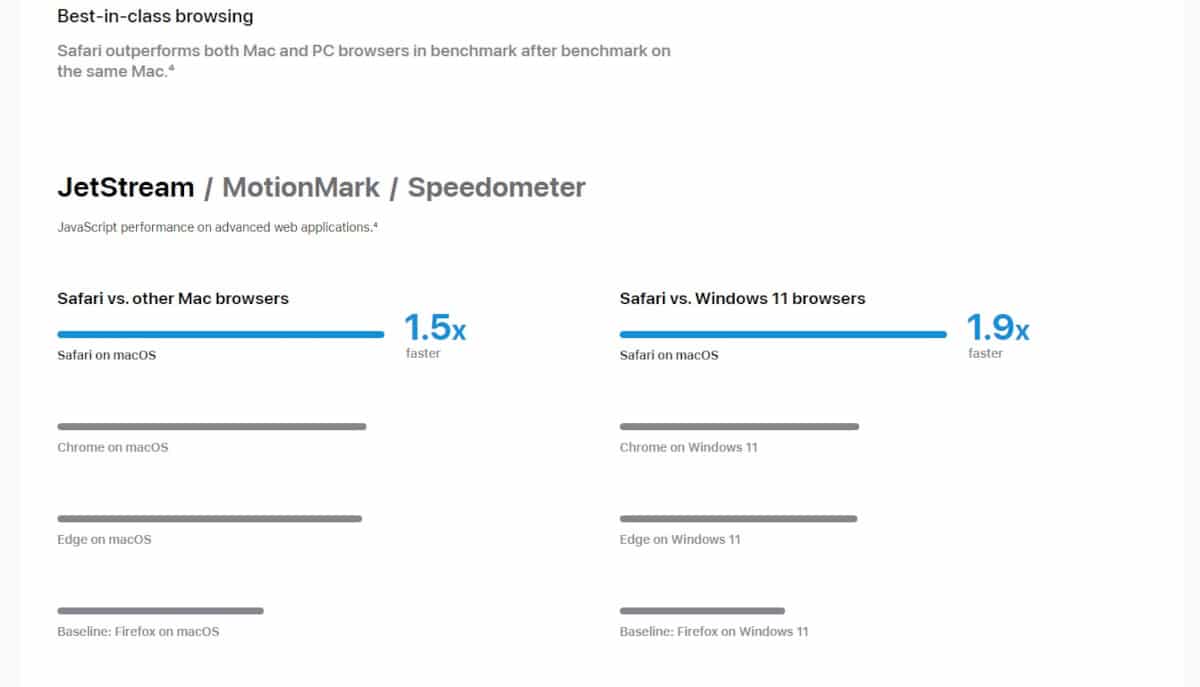
21. Safari is 1.7x faster on average than other internet browsers.
In 2021, Safari was more than 50% quicker on average than Chrome3. More things can be done online on a single battery with Safari than with any other browser. Fastforward to 2025, Safari remains to be faster than other internet browsers by an average of 1.7x.
Safari used Jetstream, MotionMark, and Speedometer to prove its point of being the “best-in-class” browser. Results show that Safari was 1.5x faster than other Mac browsers and 1.9x faster than other Windows 11 browsers. Now talk about speed!
22. Safari’s power efficiency increased by 166.67% for video streaming in four years.
Safari prides itself for its improved power efficiency, which means a single charge enables users to do more with their mobile phones. One of which is to watch streaming video that is 4x longer than Chrome. Safari can actually allow users to watch streaming videos for up to 18 hours as of March 2025! Did I mention this involves 4K HDR quality videos? Awesome, isn’t it?!
This enhanced capacity of Safari is 166.67% higher than what it can do in 2021. Back then, Safari’s streaming video time is up to 1.5 hours longer than on Chrome, Edge, and Firefox4. Safari’s power efficiency is one of its great features along with being a much lighter browser. It even saves battery life on iOS and Mac devices when used with numerous tabs open.
23. Safari is 40% faster in loading frequently-used websites than Chrome.
Apple announced that it is constantly finding ways to make their built-in internet browser, Safari, better than other browsers. As of March 2025, Apple reports that Safari has a more than 40% faster load time for frequently-visited websites compared to Chrome.
A couple of experts say that Safari’s speed is the fastest, which gives it a competitive lead. It is also the safest in terms of security so it really keeps browser information private. One of these security features include a cross-site tracker using Intelligent Tracking Prevention (ITP). ITP prevents user data from being obtained by websites or other software and enlists these in Safari’s privacy report.
These are some of the appealing features of Safari though some users still prefer a more appealingly-designed interface, which other browsers provide.
24. Safari is available in 19 languages to date.
As of March 2025, Safari is available in 19 languages. These are: Arabic, Chinese (Simplified), Chinese (Traditional), Dutch, English, French, German, Indonesian, Italian, Japanese, Korean, Polish, and Portuguese (Brazil). It is also available in Russian, Spanish, Thai, Turkish, Ukrainian, and Vietnamese.
25. Safari replaced Navigator as the default browser for Macintosh systems in 2023.
Apple created the graphical web browser known as Safari. It is based primarily on open-source code, particularly WebKit. It replaced Internet Explorer for Mac, Cyberdog, and Netscape Navigator as the standard web browser for Macintosh computers in January 2003. A Windows version was available from 2007 until 2012; it is supported on macOS, iOS, and iPadOS.
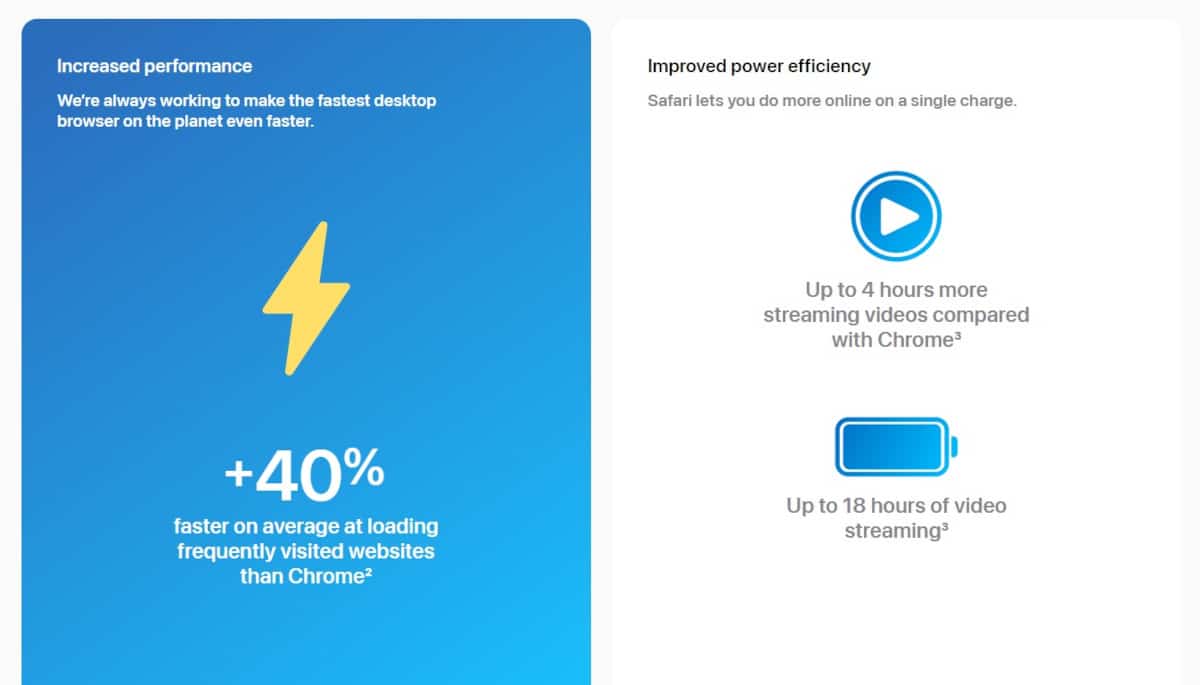
26. Safari was supposed to be named “Freedom”.
Steve Jobs was fascinated by the term “Freedom,” according to Don Melton, a former Apple employee who worked on the Safari project. He had put much effort into persuading the group of this name. Freedom represented their release from Microsoft and the then-dominant browser, Internet Explorer.
27. Safari has had 18 versions in its 22 years of existence.
Twenty-two years afters its launching, Safari has undergone multiple revisions and enhancements leading to 18 versions to date. Apple launched Safari’s latest version, 18.3, for macOS and iOS devices in January 27, 2025.
The new version is said to include a new feature and fixes 23 bugs and 1 depreciation in Safari for its users. It also runs on the latest macOS and iOS versions. Accordingly, Safari ceased offering updates for Windows and non-Apple operating systems since May 9, 2012 when its 5.1.7 version was released.
28. In 2021, Safari required 54 days to patch any security flaws.
Safari provides security features like private browsing windows, privacy reports, and protection from intelligence tracking. Records show that Apple issued a security patch in May 2021 to fix the Safari’s security flaws after 54 days it was discovered.
But Apple’s release of patches for security flaws has become faster the last couple of years. It still utilizes Google’s Safe Browsing database for Safari just as Chrome does for consumer protection against malicious websites. Though patches for Safari have been synchronized with iOS, macOS, and iPadOS updates, which is done regularly.
An example was in November 2024 when Apple addressed four security flaws in Safari within a single day of their discovery, as per TheHackerNews.
